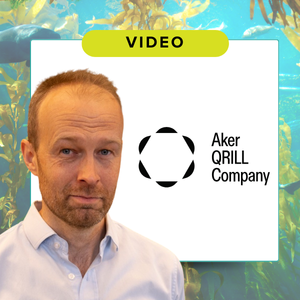Video Interview: The Role of Krill Nutrition in Sustainable Aquaculture

Watch a short interview with Pål Einar Skogrand, Vice President Policy and Impact at Aker Qrill Company, on the role of krill-based nutrition in improving fish health and bolstering resilience in the aquaculture sector.
Read the full transcript below:
Callum Broadley Hello. I'm Callum Broadley Partnerships Manager for the Blue Food Innovation Summit. Taking place in London this April 8th and 9th, I'm delighted to be joined by Pål Skogrand, Vice President, Policy and impact at Aker Qrill Company. Welcome, Pål. Pål Skogrand Thank you very much. Nice to be here. Nice to have this opportunity. Callum Broadley It's great to be speaking to you ahead of the summit. Let's dive in. What technological innovation and science-based strategies are you implementing to transition global fisheries towards nature positive practises? Pål Skogrand Yeah, so nature positive practises, that's really all we're aiming for, isn't it? It's about renewable resources about harvesting from a regenerative resource. It's about sustainability. So first of all, coming from our point of view, we harvest krill in Antarctica. So, this is this is probably the world's biggest single species biomass. That means that it is very much harvested, it's very much underutilised. But it's also the fact that there are not many companies harvesting it, so the operators need to take a lot of responsibility in monitoring the krill biomass and collecting the scientific data. So, what is become really important for us is to enable the management system of krill which is called ‘CCAMLR’ that's a treaty organisation responsible for conserving and managing the entire Southern Ocean ecosystem. It's to enable them to make science based decisions and science based regulations we have therefore built a lot of capabilities within data collection from our vessels and the platforms that we have. So then we support the what you would call the regenerative resource of krill and harvesting from that in a sustainable way. Callum Broadley And what role does krill-based nutrition play in improving fish health and performance, and how does it contribute to a more resilient aquaculture sector? Pål Skogrand Yeah, this started with a bit of a curiosity and the fact that the early aquaculture farmers back in the 70s, eighties, they had very limited experience with krill. The krill was then harvested in, in very small, small quantities, but they were basically raving about krill and the let's say the functional effects that it had. Within the agriculture. So that was the point of departure for us when we started picking up. And building our company 20 years or so later, we’re building a market for an ingredient that enhances growth and health. And that is whether you use it for shrimp or salmon. It's basically growth, yield, health. So this is what leads now to the modern aquaculture farmers to say that, you know, we know that we need to include a certain amount of marine ingredients into the feed, and by using krill. We will actually use less marine ingredient than we would we would use otherwise because you can include say 3% grill and have the same effect as 6% of another marine ingredient, so it's a powerful raw material that can be used strategically by the farmer and it's very, very sustainable. Callum Broadley There's one message you'd like the industry to take away from your participation at the summit. What would it be? Pål Skogrand I'm pretty old school when it comes to that. I want to just underline the significance of science making science-based decisions making sure that the resource that you harvest from or that you make is based on data and science and that is it. It's sort of given in today's day and age when there's a lot of opinions and there's a lot of half-truths out there. You can always go back to the data and always go back to the science and then then you can then you can have discussions around that science about which ways to go, but you cannot base your future and base your decisions on assumptions. So yeah, I think that's our main message. Callum Broadley Thank you so much for your time today, Paul. Can't wait to hear more from you at the summit.
)
)
)
)
)
)